Emergency Dentistry Midwest City
Get Fast Relief from Dental Pain

Dental emergencies can happen when you least expect them and can often feel scary – but do not worry! Our expert team at Midwest City Dental Center stands ready to assist you in an emergency– often on the very same day the accident or injury happens. Dr. Steven Kendrick has many years of experience providing urgent oral care and will be able to quickly reduce your dental pain and anxiety with emergency dentistry in Midwest City. Call us today to get fast relief from dental pain!
Why Choose Midwest City Dental Center for Emergency Dentistry?
- Same-Day Emergency Appointments Available
- Advanced Technology for Fast, Precise Treatment
- Numerous Options to Make Emergency Dentistry Affordable
What to Do in a Dental Emergency
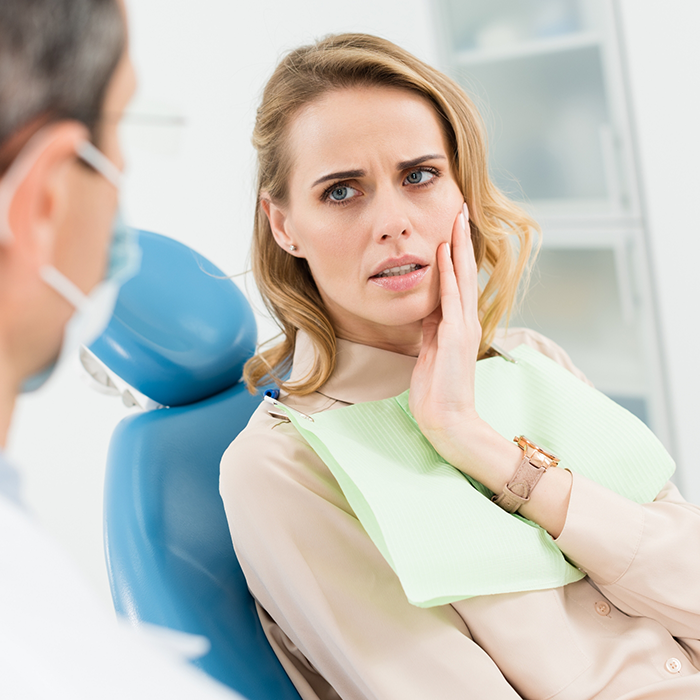
- Step 1: Call us right away! We do everything we can to see emergency patients on the same day they call us, and we’ll also instruct you on how to manage your emergency until you can reach us.
- Step 2: See Dr. Kendrick for an exam. Dr. Kendrick will see you right away to get you out of any serious pain and evaluate your situation.
- Step 3: Make a treatment plan. Dr. Kendrick will review his findings with you and fully explain which treatment(s) he recommends. Together, you’ll make a treatment plan to get your oral health back on track.
- Step 4: Get the care you need right away. Thanks to our experienced team and advanced dental equipment, we’re proud to offer a wide variety of treatments that can address dental emergencies right away, like our CEREC same-day dental crowns.
The Most Common Dental Emergencies
There are two general categories when it comes to dental emergencies: long-term infections, characterized by toothaches, and unexpected accidents or injuries that can result in a chipped or dislodged tooth or other dental trauma. At Midwest City Dental Center, we are well-equipped to deal with any type of dental emergency you may experience. Even if you are unsure if your situation requires urgent attention, we encourage you to call us so we can help you determine what you should do next to protect your smile. Below, you’ll find some important information on the most common dental emergencies we treat here at Midwest City Dental Center.
Understanding the Cost of Dental Emergencies

There is no set cost of emergency dental care, as the appropriate treatment will vary depending on your unique situation. Resolving a dental emergency could be as straightforward as providing a prescription for antibiotics or as complex as performing a root canal or tooth extraction. Dr. Kendrick will be able to provide you with an accurate cost estimate when you visit our dental office for your emergency appointment. Remember, at Midwest City Dental Center, we are always committed to providing quality oral care at an affordable price, so do not let any financial concerns put you off from seeking the urgent care you need!
Every Dental Emergency is Different
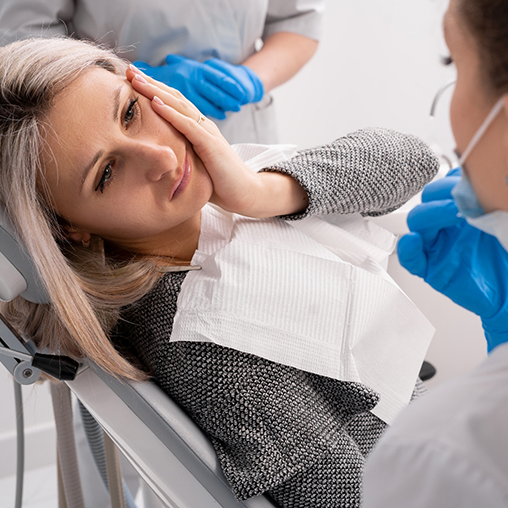
We cannot stress enough the importance of contacting an emergency dentist in Midwest City as soon as possible once you notice a problem with your teeth or gums. Unless you schedule an appointment, it’s impossible for us to give you a cost estimate. Dr. Kendrick will need to examine your mouth, evaluate the extent of the damage, and determine which procedure(s) would be best suited for healing your smile. Common treatments for dental emergencies include:
- Tooth-colored fillings
- Dental crowns
- Root canal treatment
- Tooth extractions
- And more!
Before moving forward with the treatment process, our team will go over the specifics as well as any pricing information you need to know.
Does Dental Insurance Cover Dental Emergencies?
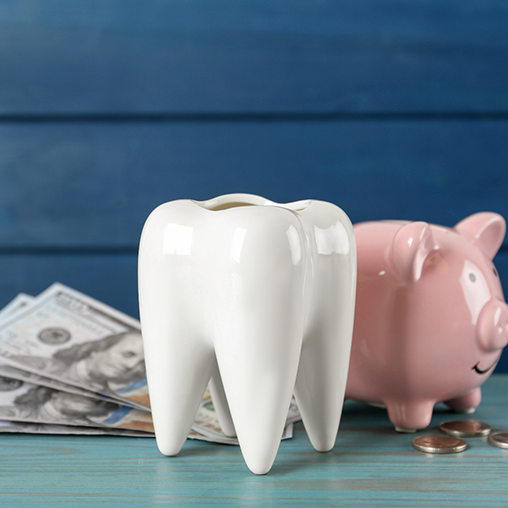
Most dental insurance providers understand that accidents happen from time to time. It’s common for your plan to cover the cost of one emergency exam per year as needed. Additionally, many services commonly used to treat hurting teeth, such as root canals and extractions, qualify for 50-80% coverage. Our team welcomes most dental insurance plans and can even help you with all of the paperwork involved!
Other Options for Making Dental Emergencies Affordable

Even if you don’t have insurance, we have ways of helping you reduce the cost of dental emergencies. For example, we proudly partner with CareCredit, a third-party financier that offers low-to-no interest rates on flexible payment plans. You can use these plants to split up the cost of your treatment into more manageable installments, allowing you to repair your smile without breaking the bank!
Taking Care of Your Smile Can Save You Money
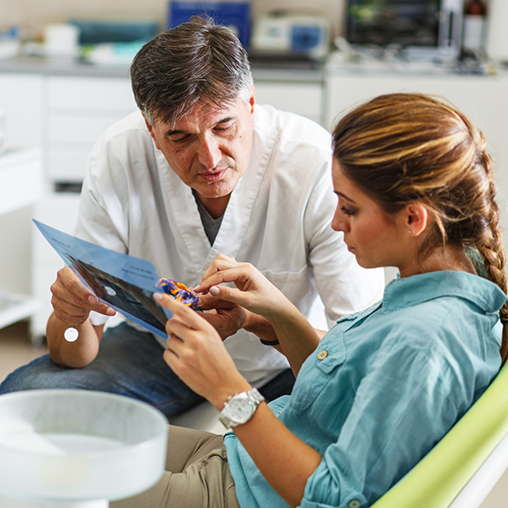
While some dental emergencies spring up out of nowhere, many actually result from long-term poor oral hygiene. In many cases, regular dental checkups and cleanings can prevent these emergencies from occurring in the first place. If Dr. Kendrick can spot oral health problems early on, he can treat them before you require urgent care, resulting in lower dental bills overall.
Another way to reduce the cost of emergency dentistry in Midwest City is to seek treatment right away. Dental problems like toothaches usually do NOT heal on their own; in fact, they tend to get worse over time, increasing the risk that you’ll need a more invasive and expensive procedure.
How to Prevent Dental Emergencies

Dr. Kendrick and our team are always ready to help if you face a dental health crisis, and we wholeheartedly recognize that not all accidents and injuries can be prevented. However, there are some simple precautions you can take to protect your smile, reduce your chances of decay and damage, and hopefully avoid a trip to our emergency dental office in Midwest City.
Visit Your Dentist Regularly
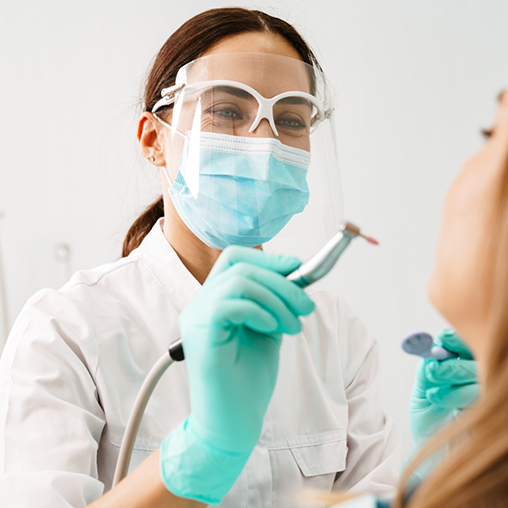
If you want to prevent dental emergencies in Midwest City, scheduling regular appointments with our office is a great place to start. At your biannual exams and cleanings, we will look for any early signs of oral health issues and strive to address them before they become serious, cause you pain, and require extensive treatment. Thorough cleanings and coaching on at-home oral care may even help you to avoid problems altogether.
Maintain Good Oral Hygiene Habits at Home

Your daily habits play a huge role in how your teeth and gums fare over the long term. To maintain a clean mouth, you should:
- Brush at least twice a day. Use gentle strokes and be sure to clean all the surfaces of your teeth that you can reach, including their backs and the area along the gumline.
- Floss daily. Water flossers and floss picks are moderately effective, but old-fashioned string floss is the best way to clean the tight spaces between your teeth.
Watch What You Eat

Sugary foods contribute to plaque buildup, which is a precursor for cavities. Acidic foods and beverages can weaken your enamel and leave it vulnerable to erosion. It is best to consume such items in moderation if you choose to consume them at all. Instead, try to focus on eating a diet that is rich in tooth-friendly nutrients, such as calcium, vitamin C, and vitamin D. Fortified dairy products, green leafy vegetables, and antioxidant-packed teas are all excellent choices.
Wear a Mouthguard
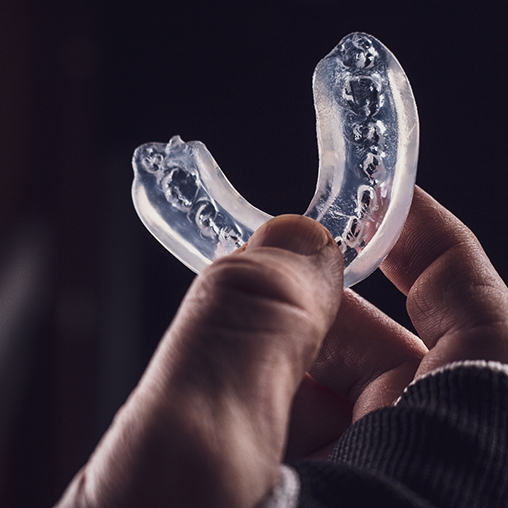
There are two types of mouthguards. One is used primarily for sports, while the other is designed to stop nighttime bruxism (teeth grinding during sleep). Both types of mouthguards can prevent damage to your teeth, and both are available at over-the-counter retailers. However, custom mouthguards from a dentist tend to be much more comfortable and provide a higher level of protection. If you aren’t sure if you grind your teeth or if your favorite sport really requires a mouthguard, feel free to ask us at your next appointment.
Use Tools, Not Teeth to Open Packaging

It can be tempting to use your teeth to cut the tags off of new clothes or open that stubborn package that just arrived on your doorstep. However, doing so is a bad idea. You could end up chipping a tooth or causing premature wear and tear to your enamel. It is best to use a tool, such as scissors or a knife, to take care of all your package-opening needs.
Dental Emergency
FAQs
Will My Toothache Go Away By Itself?
Despite what many people think, a toothache will not recover on its own. If a throbbing pain has suddenly vanished, this may indicate that an infection has grown and damaged the nerve of your tooth. Therefore, you should schedule an appointment with Dr. Kendrick right away if you’re experiencing discomfort with your smile. He’ll be able to assess your oral health, determine the root cause of the toothache, and create a detailed treatment plan to fully restore your smile.
Should I Visit the Emergency Room First for Dental Emergencies?
You should only visit an emergency room instead of your dentist if your emergency is potentially life-threatening, such as a broken jaw or difficulty breathing. ERs typically do not have dentists on staff, meaning they won’t have the tools or means to treat most dental emergencies effectively. If you’re experiencing dental-related injuries like a lost filling or knocked-out tooth, then your first choice should be to call our team.
Do I Still Need to Visit If My Chipped Tooth Doesn’t Hurt?
Although you may not feel discomfort from your chipped tooth, it’s best if you schedule a dental visit with our team. Even if you aren’t experiencing severe pain, leaving the inner layers exposed can make it more susceptible to damage later on. Without professional treatment, your chipped tooth can accidentally break more and cause sensitivity and soreness. That said, treatment can wait a day or two if needed, as long as you take care of your injured tooth with proper dental hygiene. Just be sure to not hold off on seeing us for a prolonged period.
What Should I Keep in My Emergency Dental Kit?
From a lost filling to a cracked tooth, having a dental emergency can be unsettling and overwhelming. The best way to make the experience as safe and comfortable as possible is to remain prepared at all times. For this reason, you might consider keeping an emergency dental kit close by containing the following components:
- Gauze pads
- Cotton balls
- Sterile gloves
- Dental cement (or some effective temporary filling material)
- Denture adhesive
- A storage container big enough to hold a tooth or restorations
- Petroleum jelly
- Anti-inflammatories, like ibuprofen
- A cold compress or ice pack
- Contact information for our emergency dentist in Midwest City
If you have any further questions about dental emergencies, feel free to contact our friendly staff to learn more today!
How Should I Sleep with Tooth Pain?
There are a few things you can try at home to make it easier to sleep with a toothache. The first method is to use pillows or cushions to keep the head elevated, as this will slightly reduce the blood pressure within the tooth. You can also try using over-the-counter pain relievers or a cold compress and avoiding foods that are cold, hard, or acidic before going to bed. Clove oil is an old home remedy for toothache, so try soaking a cotton ball with it and holding it over the afflicted tooth for temporary relief.
What Does Throbbing Tooth Pain Mean?
Throbbing tooth pain is likely to be a sign of an infected or inflamed tooth, and it can be caused by cavities or cracks that expose the pulp inside to air and bacteria. When the pulp becomes irritated or infected, the nerves within it send distress signals to the brain, resulting in pain. While tooth decay is the usual culprit, it can sometimes result from chronic teeth grinding and clenching.
Do Chipped Teeth Heal?
Enamel is the hardest substance in the human body, but, while it can remineralize itself to prevent erosion, it cannot grow back after being chipped or cracked. However, restorative and cosmetic dental treatments can patch up the wound, restore the tooth’s appearance, and protect it from further injury and infection.
Are Knocked-Out Baby Teeth a Dental Emergency?
Since baby teeth are designed to fall out eventually, there is no need to try to reinsert one back into your child’s open socket. However, the baby teeth coming out too soon can lead to complications with the emergence of the adult teeth, so it’s important to schedule an exam for your child to make sure no damage has occurred if this happens. If your child’s mouth won’t stop bleeding after the loss of a baby tooth or if you suspect that their jaw has been damaged, take them to the emergency room.
